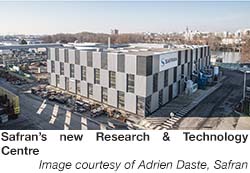Safran opens new research centre
03/05/2019
Safran has opened a new research centre for advanced turbine blades used on aeroplane and helicopter engines at its plant in Gennevilliers, near Paris, France. The ceremony was attended by Florence Parly, French Minister of the Armed Forces, Ursula von der Leyen, German Minister of Defence, and Philippe Petitcolin, Chief Executive Officer of Safran.
The ceremony was attended by Florence Parly, French Minister of the Armed Forces, Ursula von der Leyen, German Minister of Defence, and Philippe Petitcolin, Chief Executive Officer of Safran. The advanced turbine blades research facility is part of the corporate Research & Technology Centre, Safran Tech. Housed in a building spanning 3000 m2 (32,300 ft2), the new research unit is staffed by approximately 30 engineers and doctoral candidates and is fitted with state-of-the-art machinery and equipment, allowing them to carry out all of the development work needed for next-generation high-performance turbine blades.
The new unit deploys its proven expertise, along with innovative technologies such as multi-disciplinary design, single-crystal casting, 3D printed ceramic cores, thermal coatings, cooling circuits, digitised processes, self-adapting micro-drilling, non-destructive testing based on artificial intelligence and more.
These turbine blades will be incorporated on the current Rafale engines to improve aircraft dispatch reliability and reduce through-life maintenance and production costs. The technologies developed by this centre will also be used on the future high-performance engine from Safran Aircraft Engines, the French-German Future Combat Air System (FCAS). In addition, the centre will develop technologies for use on civil aircraft engines and helicopter engines.
During the inauguration, Florence Parly and Philippe Petitcolin signed the renewal of the small- and medium-sized enterprise (SME) action support agreement. Witnessing this signature were three SMEs: Alliance Outillage, Chesneau and MSC Scanning, all of which are suppliers to the research centre.
Gennevilliers, one of the Group’s legacy sites, has been in operation for 110 years. Located about 15 km northwest of Paris, it spans a surface area of 15 hectares along the Seine. It provides forging, casting and machining services for engine parts from Safran Aircraft Engines and is organised into three centres of excellence: turbine blades, compressor blades and rotating parts.
Safran is an international high-technology group, operating in the aircraft propulsion and equipment, space and defence markets. It has a global presence, with more than 91,000 employees. Working alone or in partnership, Safran holds both world and European leadership positions in its core markets. The company pursues a continuous strategy of differentiation through innovation and undertakes extensive ongoing research and development programmes.